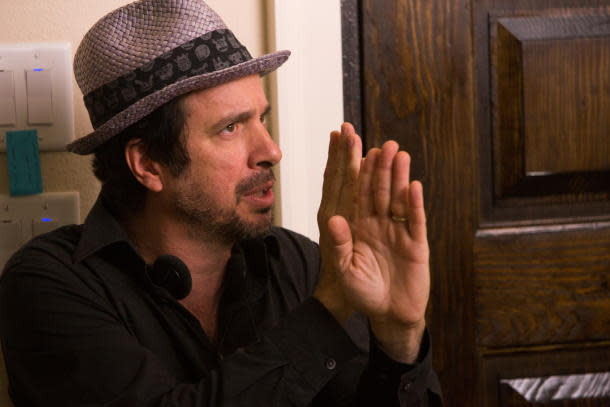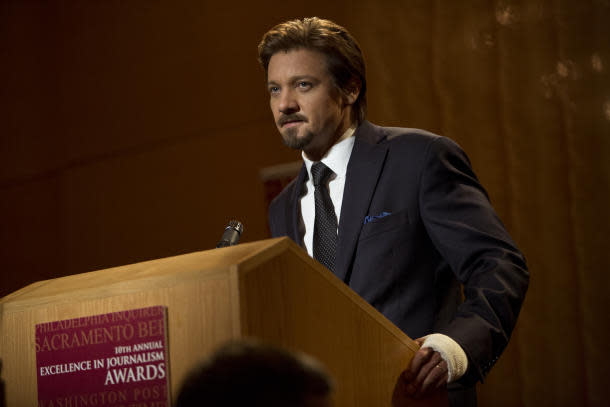Star Apps: Michael Cuesta
When Michael Cuesta ("L.I.E.," "12 and Holding," "Homeland") signed on as director of "Kill the Messenger," starring Jeremy Renner as Pulitzer Prize-winning San Jose Mercury News journalist Gary Webb, he was already familiar with Webb's controversial story. What he didn't yet know was how much he had in common with the late investigative reporter, who exposed the CIA for engaging in cocaine smuggling to fund Nicaraguan Contra militias. "Gary Webb wasn't what people imagine journalists to be, like snobby intellectuals," he said. "He loved The Who and Mott the Hoople, was a hockey player and a motorhead."

Director Michael Cuesta on the Kill the Messenger set.
(Credit: Focus Features)
This is your second time directing Jeremy Renner, with the first instance being "12 and Holding." What's it like working with him?
He's just a fantastic actor. He's instinctual. I think he communicates so much with no words. Being a photographer, which I was originally, I just love to capture that face, which communicated so much of an inner life. And the trust that you feel when working with another artist -- I knew he trusted me, and I trusted him. So when we worked together, I knew that it was going to be a seamless collaboration. We have a similar sensibility about movies and about how to approach something in the most honest way.
When you signed on as director, was there any nervousness about ruffling any feathers in the government or the media?
No, I wasn't nervous, because I inhabited his character and came from him and understood why he did what he did, and I agreed with it, with his doggedness. I related to his sense of, "There are some ugly truths here that people need to know, and we need to get that conversation going." That was his job, and I really related to that. Getting on his shoulders was the thing I needed to do in order to not feel nervous about the film being discredited. The research that I did, I saw that the ocean he was entering was a very complex, detailed, almost unwinnable war for him. And I just feel like the film's necessary, and the story needed to be told for people to understand that. These investigative journalists, these cops on the beat, these men of the people needed to expose the imperfect complexity of how our government works.
If there was any nervousness, I would think it's from my selfish reasons, thinking I need the support of The New York Times and the big papers for the film. I hope there's no bias when the movie comes out, 'cause we're attacking them a little bit. I hope the Los Angeles Times and the New York Post don't undo the film for the wrong reasons.
Was there anything you left out?
I made more of those choices in Gary's personal story. The big one was to not make a movie about who killed Gary Webb, as far as this suspicious suicide where the gun went off twice and he took two bullets. I felt it was important not to focus on that, because then it would just become about that and not about the process of him investigating the story and what happened to him as a result of that. That was his death: his credibility being destroyed. I think that was devastating. Suicide came many, many years later and came from a struggle with depression that he always struggled with. So that part I didn't want to focus on. It was a slow, sad decline and a really undramatic six years. I think his death was showing up for an awards show and being given an award for something he was discredited for. That was the tragic irony for me. I thought that was the ending of the movie. He actually has nobility in that moment, and he actually tells them the truth up there and is a man about it.

Jeremy Renner reenacts Gary Webb's awards speech in a climactic scene from Kill the Messenger.
(Credit: Focus Features)
When did you first become aware of Gary Webb's story?
I was the last one to come on the project. When I read the script, I remembered Gary Webb on "The Montel Williams Show," and I remember the allegations, because I was a big follower of the Iran-Contra affair. So when Webb's thing came out, it was like, "Oh, Contra cocaine is part of that, too." I knew he was being attacked, but I didn't know the level that he was being discredited, so that was the big discovery for me and the reason why I wanted to come onboard. I was already fascinated by his investigation and was devastated and thought it was an important story to tell that his own people destroyed him, with the infighting in journalism and the jealousy. Those other papers didn't do the proper reporting in the '80s, and I think Webb getting the story in the '90s in a small paper like that was big. I really related to that. He was a man of the people -- just a regular guy. You gotta love that. I support him. He's like a good cop.
Are the book and the movie the articles that were never written about him?
Yeah. It's close to the book "Kill the Messenger." Did people read it when it came out? Probably not a lot. But now with the film, it's probably selling more copies since it has Jeremy's face on it. When the LA Times wrote an obituary on him, when he committed suicide, they called him "Gary Webb, the discredited journalist." So even in his death, they were killing the messenger, so I think this movie has a way of redeeming that a little bit. The guy wasn't perfect. He was a flawed guy, but he didn't deserve to be piled on like that. I think journalism should encourage journalists to do what you're supposed to do. As Gary says at the end, "I thought my job was to tell the truth, connect these dots, publish those things, and start that exchange between the public and the government." You have to question authority. We need people like that.
Do you have an experience from your own life where you had to choose between being truthful about something or taking the easy road and saying nothing?
I'd like to think that a couple films that I've made, especially my first film, that was never to glorify pedophilia or anything, but to show that there are oddly many faces of love or many faces of tenderness that come in sometimes the most grotesque packages -- but it's there. So I was told, "Don't do it." I didn't understand it. It was like it's real, and it does exist in the world, so why not bring it into a story and shed some light on that? I relate to Gary's...I've always been a bit of an outsider myself. I've clearly taken commercial jobs, like we all do, and done television shows that are not my cup of tea, but I'm so lucky to be able to find subjects that are complex. My job was not to indict the CIA. It's more about shedding light on stuff and getting people talking and being a little bit of a provocateur. You gotta question that. If you don't, then we live in a police state.
What are your top mobile apps?
1. A big one is Artemis. It's a director's viewfinder. It's amazing. It gives you every lens that's made professionally on your phone. And you can storyboard your whole film on your phone.
2. Waze, which I recently discovered this summer.
3. NYC Subway, 'cause I know the subways, but it tells you what subways are closed down and which are running, on a daily basis. I'll use that a lot.
4. I love my Translator with Voice. I can send my friend in France emails, and it just translates them into French.
5. Pix: I have every daily from my film and every cut and versions of the edits that I worked on from last year.
6. My Thesaurus app. You're always using that. You're a writer, you know. You're out interviewing a director and can't find the right word? That always comes in handy.


